
Fields of Research (FoR)
Coding, information theory and compression, Communications engineering, Wireless communication systems and technologies (incl. microwave and millimetrewave), Signal processing, Quantum information, computation and communicationSEO tags
Biography
Mohammad Rowshan ↗️ is a Researcher and Educator at the School of Electrical Engineering and Telecommunications (EE&T).
New Release in IEEE Series on Digital & Mobile Communication
Polar Codes: From Theory to Practice — now available from IEEE Press & Wiley.
Lean more here: Wiley Online Library - IEEExplore - Google Books.
Feel free to share any feedback to help improve future editions.
My Qualifications
- Ph.D. in...view more
Mohammad Rowshan ↗️ is a Researcher and Educator at the School of Electrical Engineering and Telecommunications (EE&T).
New Release in IEEE Series on Digital & Mobile Communication
Polar Codes: From Theory to Practice — now available from IEEE Press & Wiley.
Lean more here: Wiley Online Library - IEEExplore - Google Books.
Feel free to share any feedback to help improve future editions.
My Qualifications
- Ph.D. in electrical engineering (communications technologies), Monash University, 2021,
- M.Sc. in integrated circuit design engineering, the Hong Kong University of Science and Technology (HKUST), 2016,
- B.Eng. (Hons) in electrical and electronic engineering, the University of Nottingham, 2015 (ranked 1).
During his doctoral studies, he visited the telecommunications circuits laboratory (TCL) at École Polytechnique Fédérale de Lausanne (EPFL) in Lausanne, Switzerland for six months in 2019. Additionally, he holds a B.Sc. degree in industrial engineering as well.
My Research Activities
His research focuses on the intersection of coding and information theory, wireless communications, quantum computing and communications, machine learning, and hardware architecture design. During his PhD studies, he concentrated on polar codes and their variants, including code design and decoding algorithms for short codes. He is keen on tackling fundamental problems and exploring new research directions.
If you are a researcher in his field:
- You are welcome to contact him to ask any questions related to his published works,
- You can find the MATLAB/Python/C/C++ scripts of his developed algorithms and schemes on GitHub or CodeOcean through the IEEExplore publication pages ("Code Available" button at the top-right corner, or "Code & Datasets" section).
- He is interested in collaborating with the people in the field and contributing effectively by taking part in the work.
My Research Supervision
Areas of supervision
Coding and Information theory, communications theory, fault-tolerant quantum computing and storage, bioinformatics, machine learning, and VLSI design.
Currently supervising
- Hamish Shaw (Ph.D.), Delay-Doppler Communications, Pubs: Delay-Doppler Channel Estimation for OFDM, Improving OFDM Using Delay-Doppler Channel Estimation
- Xinyi Gu (Ph.D.), Channel Coding, Pubs: Rate-Compatible PAC Codes, Reverse PAC Codes, Look-ahead List Decoding, PAC Codes Meet CRC-Polar Codes
Former students:
- Xinyi Gu (M.Phil.), Channel Coding, 2022-2023, Pubs: BP Decoding Hardware Architecture
My Teaching
- TELE9753 Advanced Wireless Communications in Term 1 (Feb-May), 2023, Lecturer and Tutor
- TELE3113 Analogue and Digital Communications in Term 1 (Feb-May), 2024-25, Coordinator, Lecturer and Tutor
Location
Map reference (Google map)
